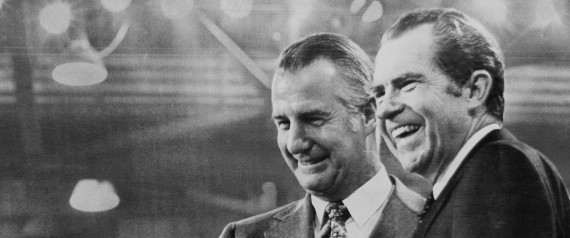WASHINGTON -- The Republican Party used to be dull and relatively reasonable. It stood for spending restraint, free markets (for big companies) and gentle regulation of business. But it also stood for, or accepted, federal public works and scientific research, a foreign policy that was neither isolationist nor war-mongering, the use of federal power in the name of racial justice, progressive taxation, and a public piety of the most anodyne, “In God We Trust” kind.
The party of Dwight Eisenhower -- of Scotch and soda and sotto voce -- is all but extinct.
What’s left of it is barricaded in the U.S. Senate, under fire in a deadly turf war with Blue Meth Republicanism, a movement at times so angry, reductionist, apocalyptic, God-invoking, fear-mongering and obsessed with purity that it seems to have been concocted in the sub-basement of "Breaking Bad."
One of its younger, more aggressive leaders, Sen. Ted Cruz of Texas, just delivered a grandstanding faux filibuster against Obamacare. Insiders and “mainstream” media weren’t impressed, but then they weren't his audience. The Blue Meth Crew was, and they will be back.

So where did this potent and, to its critics, self-destructive new formula come from?
Just as Walter White needed to know his chemistry, you need to know your history. Here’s a HuffPost Historama -- a brief look at how, over the decades, the Grand Old Party of grandfatherly Ike cooked itself into the anti-government Party of the Temper Tantrum.
1960: Bill Buckley & The Sharon Statement

(AP Photo/Arnold Walter)
On Sept. 11, 1960, acolytes of conservative writer and editor William F. Buckley gather at his Connecticut home and issue the founding document of modern conservatism. A charismatic Yalie, Buckley had five years earlier founded a magazine he said "stands athwart history yelling Stop." The Sharon Statement is a terse libertarian credo, extolling individual freedom, minimalist government and a market economy. The proto-tea party, anti-federal movement is born.
1964: Barry Goldwater
He runs for president on principles espoused by Young Americans for Freedom, which is critical of Social Security and civil rights laws, and is swept away by Lyndon Johnson. But the campaign inspires a generation of young conservatives in libertarian antagonism and grassroots action.
1968-72: The Southern Strategy

(Photo by Paul DeMaria/NY Daily News Archive via Getty Images)
Led by theorist Kevin Phillips and political operative Harry Dent of South Carolina, Richard Nixon turns the "Party of Lincoln" into the party of the Old South, courting Southern whites fearful of the civil rights movement. The immediate issue is race, but the long-term impact is to undermine the GOP's Civil War-based faith in federal power.
1980: The Moral Majority

The Rev. Jerry Falwell (right) gestures while talking with President Ronald Reagan at the Baptist Fundamentalism '84 conference on April 13, 1984, in Washington. (AP Photo/Ira Schwarz)
With the South on board for racial reasons, Ronald Reagan expands the circle of social conservatism by uniting “Bible-believing” Southern evangelical Christians (such as the Rev. Jerry Falwell's Moral Majority) with Northern conservative Catholics (allies of the Vatican right) under the banner of opposition to abortion and gay rights. One result: rising skepticism among the grassroots GOP of science, government-sponsored research and theories such as evolution.
1982: The Federalist Society
Founded at Harvard, Yale and Chicago law schools, the Federalist Society aims to school the conservative best and brightest in how to use the law to limit the national power of Washington. Members would come to include John Roberts, Samuel Alito -- and Ted Cruz. Result: a new cadre of lawyers eager and able to beat Ivy League liberalism at its own jurisprudential game.
1985: The Democratic Leadership Council
After Walter Mondale, a pro-labor, liberal Minnesota Democrat, loses every state but his own to Reagan in the 1984 presidential race, Democrats ditch the frank defense of the social welfare state and turn to a generation of moderate politicians such as Bill Clinton, who eventually declares that "the era of big government is over.” Result: Democrats henceforth debate on the right’s terms.
1985-88: Ron Paul Rising
Expecting the demise of the welfare state, conservatives are chagrined to see Reagan raising taxes and cutting deals with Communist countries. Rep. Ron Paul of Texas launches his first independent presidential campaign in 1988. His ideas are an inspiration to a Houston high school student named Ted Cruz. Result: a second, younger generation of conservatives begins its rise, scornful of any accommodation or deal-making.
1988: Rush Rushes In

(AP Photo/Eric Risberg)
The founding father of conservative media, Rush Limbaugh begins the disassembly and stove piping of American journalism into ideological and operational parts. That both allows and requires conservatives (and liberals for that matter) to speak only to each other, and in ever louder voices.
2001-08: Dubya
George W. Bush’s wild spending on prescription drug benefits, his tax cuts and his costly Wilsonian war-making (not to mention Alan Greenspan’s money-printing) dismay conservatives. The Pauls, once dismissed as cranky, conspiracy-minded outsiders, become central to the conversation, especially after Bush agrees to bail out Wall Street. The younger generation -- the likes of Cruz, Mike Lee of Utah, Mario Rubio of Florida and Rand Paul of Kentucky -- gear up.
2009: Obamacare

(AP Photo/J. Scott Applewhite)
A complex plan that operates primarily by creating new customers for the private sector (insurers and hospitals), the Affordable Care Act nevertheless is denounced as the socialist last straw.
2010: The Tea Party Arrives
The tea party rises largely to oppose Obamacare and the earlier bailouts of Wall Street banks supported by George W. Bush and Barack Obama. The GOP wins control of the U.S. House on the strength of tea party candidates, and one of the Senate victors is Rand Paul, son of Ron.
Today
The GOP is in an escalating struggle with itself. Cruz may have stumbled, but the energy is still with the people who believe they “stand athwart history yelling Stop!”

